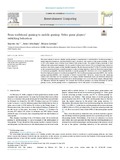Mostrar el registro sencillo del ítem
From traditional gaming to mobile gaming: video game players' switching behaviour
| dc.creator | Cai, Xiaowei | es_ES |
| dc.creator | Cebollada Calvo, Javier | es_ES |
| dc.creator | Cortiñas Ugalde, Mónica | es_ES |
| dc.date.accessioned | 2021-12-28T10:45:05Z | |
| dc.date.available | 2021-12-28T10:45:05Z | |
| dc.date.issued | 2021 | |
| dc.identifier.issn | 1875-9521 | |
| dc.identifier.uri | https://hdl.handle.net/2454/41502 | |
| dc.description.abstract | This paper intends to uncover whether mobile gaming is complemental or substitutable to traditional gaming. A human migration framework, the Push-Pull-Mooring, is adopted to the context of video game switching. A total of 340 valid samples were collected from Chinese video game forums. We applied K-mean clustering to find different video game player segments. We also applied Ordinary Least Squares (OLS) to estimate linear regression models for the whole sample and the identified segments. Results demonstrate that 7 of the 13 variables included in the conceptual model have a significant impact on the switching intention, which are Perceived expensiveness of traditional gaming(PE), Perceived flexibility of mobile gaming(PF), Perceived cost of lost benefits(PCLB), Perceived high performance of traditional gaming(PGP), Past traditional gaming experience(EXPT), Past mobile gaming experience(EXPM), and Ownership of hybrid consoles(OHC). Moreover, results from the clustering analysis show that there are two segments in our sample, labelled Unshakable stayer and Moderate intentional emigrant. Switching intention from traditional to mobile gaming is low across the whole sample, although there are differences between the segments. We conclude that traditional gaming is not being substituted by mobile gaming. In turn, mobile gaming serves a complementary role for the players of traditional gaming. | en |
| dc.description.sponsorship | We acknowledge financial support for this research from the Spanish Ministry of Education and Science [Project number: ECO2015-65393-R and PID2019-108554RB-I00] and the Public University of Navarre. | en |
| dc.format.extent | 13 p. | |
| dc.format.mimetype | application/pdf | en |
| dc.language.iso | eng | en |
| dc.publisher | Elsevier | en |
| dc.relation.ispartof | Entertainment Computing | en |
| dc.rights | © 2021 The Authors. Creative Commons Attribution-NonCommercial-NoDerivatives 4.0 International | es_ES |
| dc.rights.uri | http://creativecommons.org/licenses/by-nc-nd/4.0/ | |
| dc.subject | K-mean clustering | en |
| dc.subject | Linear regression | en |
| dc.subject | Pull-Pull-Mooring (PPM) theory | en |
| dc.subject | Switching from traditional to mobile gaming | en |
| dc.subject | Video game player segmentation | en |
| dc.title | From traditional gaming to mobile gaming: video game players' switching behaviour | en |
| dc.type | Artículo / Artikulua | es |
| dc.type | info:eu-repo/semantics/article | en |
| dc.contributor.department | Gestión de Empresas | es_ES |
| dc.contributor.department | Enpresen Kudeaketa | eu |
| dc.rights.accessRights | info:eu-repo/semantics/openAccess | en |
| dc.rights.accessRights | Acceso abierto / Sarbide irekia | es |
| dc.identifier.doi | 10.1016/j.entcom.2021.100445 | |
| dc.relation.projectID | info:eu-repo/grantAgreement/MINECO//ECO2015-65393-R/ES/ | en |
| dc.relation.projectID | info:eu-repo/grantAgreement/AEI/Plan Estatal de Investigación Científica y Técnica y de Innovación 2017-2020/PID2019-108554RB-I00/ES/ | en |
| dc.relation.publisherversion | http://doi.org/10.1016/j.entcom.2021.100445 | |
| dc.type.version | info:eu-repo/semantics/publishedVersion | en |
| dc.type.version | Versión publicada / Argitaratu den bertsioa | es |
| dc.contributor.funder | Universidad Pública de Navarra / Nafarroako Unibertsitate Publikoa | es_ES |



